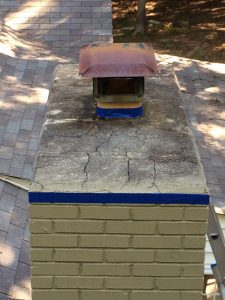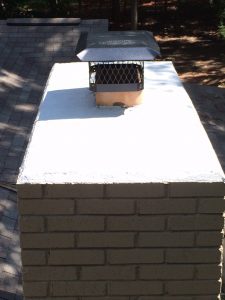Leaking Chimneys
Summer is the time of the year when I receive the most calls for a leaking chimney. This is most likely due to the higher humidity levels and weather patterns that are conducive to heaver, and longer periods of rain. In some instances, it is obvious that there is a leak. You can physically see water dripping into the firebox or streaming down the sides. In other instances, you may notice some dark patches on the floor of the firebox or on the sides, that feel damp to the touch. After repeated moisture penetration you will most likely see white streaks or white crystals on the firebox sides, back, or floor. We call these streaks and/or crystals efflorescence. Efflorescence occurs when porous materials such as brick and mortar are repeatedly exposed to moisture, and minerals are brought to the surface.
While efflorescence is unsightly, it reveals a more important issue, water is penetrating your chimney. Water can penetrate a chimney in various locations and might be from one or multiple locations. An inspection of the chimney crown is necessary. This is to ensure there aren’t any cracks and that the cap (if there is one), is in good shape. Mortar joints also need to be inspected for integrity. In many cases, the brick used may be more porous than others. This causes water to penetrate after extended periods of rain. Water penetration of the brick and mortar over time will start to deteriorate the chimney leading to expensive repairs.
What you can do for your chimney!
If you have a chimney with a water issue it is important to have the issue identified and repaired. In order to prevent damage and deterioration, you need to do this as soon as possible. There are quality products on the market that can repair chimney crowns more economically than tearing off and replacing. Every chimney should also have a cap, this reduces water getting into the flue (as well as birds, animals etc.). There are also professional masonry sealers, water and solvent based (some states ban the latter), that can be applied to the brick and mortar to prevent water penetration. These types of sealers allow the brick to breathe, if you use the wrong sealer you can seal moisture into the brick, creating other issues.
It’s important to maintain your chimney, even if you don’t have water issues now. It’s a good idea to have your chimney sealed against the elements. If you do have water issues, it’s important to address them sooner than later!
For more information about what you can do click here!
- Worn-Cracked Crown
- Chimney Crown & Cap After


